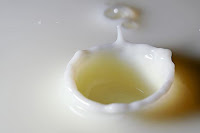
Human Milk From Cows, Like Really?
Summary: Researches in China have been working on genetically modifing cows and now have a herd of 200 cows that produce 'human' milk. It isn't quite human milk but it does have the characteristics of it. However, the milk has a stronger taste that the regular thing. It shouldn't be much longer than 10 years now that this milk will be available in supermarkets. This milk will be better for kids immune systems than the regular cow or goat.
Reflection: What more is there to say about cows producing human milk other that; are you kiddding me? I mean it's one thing to keep them all lock up for their entire live but genetically modifing them so they can do that is just wierd. I honestly don't get what people over like six will be getting from this because after a while human milk isn't doing anything regular milk can do for your body. Something else I don't understand is what the scientists are thinking. Seriouls though, there is no point other than because you can to do that.
Questions:
1) How long is it predicted it will take for this milk to be available for purchase?
2) How big of a herd do the scientists have of cows that produce human milk?
3) How does human milk benefit people?
4) What is the one difference in cow milk and human milk?



